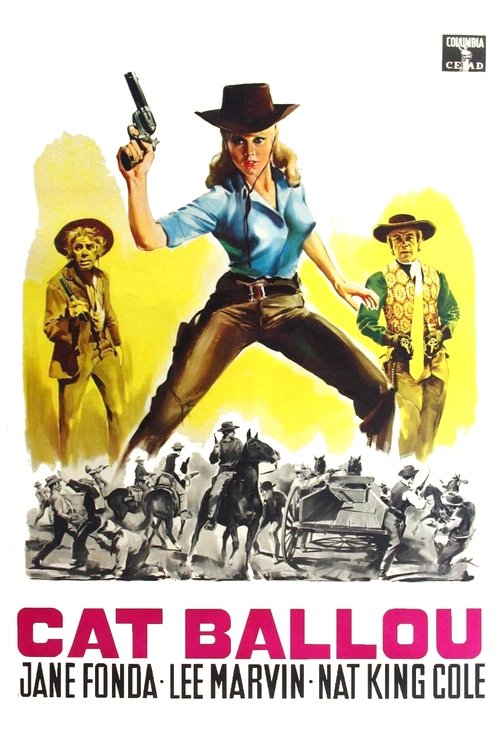I watched the heck out of this movie as a kid. I am sure of that. But aside from all the singing, I’d forgotten everything about the film. So when I sat down to watch it last week, it was with near equal parts excitement and apprehension. And after it was finished, I think I understood both why I liked it then and why it failed to leave any real impression on me as an adult.

Clay is running from the law but clearly has other things on his mind.
Cat Ballou is a mostly light-hearted Western comedy that occasionally swerves into dark, bleak territory before recentering itself on gags and slapstick. Catherine (Jane Fonda) is a just-graduated schoolteacher. She’s cute, sheltered, naïve, and just a little sneaky; she hides trashy western gunfighter stories in her volume of Tennyson’s poems so she can read them in public. When she gets home, she discovers her father, Frankie (John Marley), has fallen on hard times. The Wolf City Development Corporation is trying to drive him off his land, and the local sheriff is complicit. A threatening man with a false, metal nose keeps coming by, but Frankie refuses to take things seriously.
Catherine and ranch-hand Jackson (Tom Nardini) recruit Jed and Clay, a couple of fugitives, to help protect the ranch. But when those two turn out to be unsuitable, they send away for the legendary gunfighter Kid Shelleen (Lee Marvin), who turns out to be a useless, washed-up drunkard instead. The ranch is lost. Catherine, Shelleen, Jackson, Jed, and Clay become train robbers, seeking revenge against the Wolf City Development Corporation.
There’s a budding interracial romance between Catherine and Jackson, who is Sioux. Poor Jackson. He dares to dance in public with Cat and gets jumped by a bunch of angry white boys. In the ensuing brawl, Cat runs into Clay. That’s it for Jackson. Her affections have now moved on.

“I’m botching this interview, aren’t I?”
This is characteristic of the movie. It stakes out progressive positions (interracial romance! A woman outlaw!) then rapidly backs away. A more “suitable” romantic interest presents himself, even in a fight to defend Jackson’s right to court with Cat. Cat is not really an outlaw. She’s an idealistic innocent with a heart-of-gold who uses her womanly charms to twist all the men in her life around her finger. Storywise, relationships between the characters shift suddenly. Major plotlines resolve with a gunshot. This is a movie that is afraid of commitment.
Two “shouters,” Nat King Cole and Stubby Kaye, are enlisted to help orient the audience by singing plot transitions at the camera. It doesn’t help. With only two melodies and repetitive lyrics, the movie loses all its forward momentum when they walk on-screen. Cole and Kaye are excellent with the material they have. But having cast the two, it’s clear the producers have no idea what to do with them.

These two repeat the same words so often they practically invented EDM.
This brings me to Lee Marvin. While the rest of the cast look like they walked off the set of Oklahoma, Marvin is a refugee from a Sergio Leone shoot. Grimy, battered, squinty, and literally falling-down drunk, Marvin is the best reason to watch this almost sixty-year-old movie. The Academy agreed; they gave Marvin a “Best Leading Actor” Oscar despite Shelleen’s supporting role. It’s unfathomable that it takes him nearly an hour to show up, and then he’s not in every scene. Hollywood would not make this mistake with Pirates of the Caribbean. Johnny Depp’s performance as Jack Sparrow, which I found bizarre and unique at the time, must have been based on Shelleen. I have no evidence except my own eyes and brain. But you cannot convince me otherwise.
As a kid, I guess I was attracted to the singing, the slapstick, and Jane Fonda. But as an adult, I kept wanting the movie to stop faffing about and pick a story. It never did, which is probably why I remembered liking the film but nothing about what had actually happened. There’s a story in here somewhere. Perhaps in the original, Roy Chanslor’s dramatic western The Ballad of Cat Ballou.
This movie needs a modern, dark, gritty reboot. And that’s the first time I have ever said that sentence.


